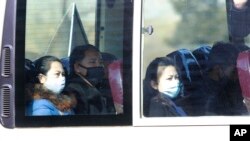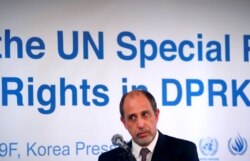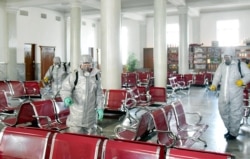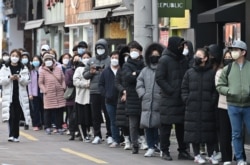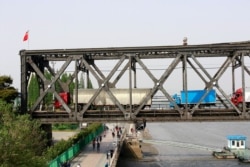The United Nations human rights expert on North Korea is calling for Pyongyang to allow nationwide “unimpeded access” so aid organizations can help battle the coronavirus.
“My call is [for] the international community to be prepared to respond [to help North Korea] and the [North Korean] government to allow for an unimpeded access for medical and humanitarian experts and actors,” Tomás Ojea Quintana, the U.N. Special Rapporteur on the situation of human rights in North Korea, told VOA Korean Service.
Although there are no confirmed cases of the coronavirus inside North Korea, the virus has been spreading fast in its neighboring countries of China and South Korea.
“North Korea has a history of restricting access to international community agencies [to] all [parts of] the territory of North Korea. And that has continued to be an issue of concern of international agencies, including United Nations agencies working in North Korea,” Quintana said.
International aid needed
The regime needs to let international aid groups work in rural areas to help diagnose cases of COVID-19 and contain its potential spread, he added.
“The government needs to further lift this kind of restrictions for accessing the countryside,” Quintana said. “And in this case, with the outbreak of the coronavirus, how serious it is, that may be something that the government should reconsider.”
Quintana said he believes North Korea needs help to contain the virus.
“North Korea alone will not be able, [in] my view, to contain the virus spreading in North Korea without the support and the cooperation and the engagement and the dialogue with the international community,” he said.
Quintana released a statement on the U.N. Human Rights website Wednesday, calling for North Korea to join hands with the international community to cope with the virus.
Neighbors confirmed cases
The virus outbreak that began in the Chinese city of Wuhan has infected more than 78,000 and killed more than 2,700 in China. China has the largest number of infections and deaths, and South Korea, with more than 2,000 confirmed cases and 13 deaths as of Friday, has the second-largest number of cases.
North Korea shares a border with China and is taking stringent measures to keep the virus at bay.
North Korean Vice Health Minister Kim Hyong Hun said Thursday the entry ban on foreigners will be in effect until diagnosis and treatments are developed.
“No foreigners have been allowed to enter [the country] through entry points at the border, along with sea ports and airports,” Kim said in an interview with the Choson Sinbo, a pro-North Korean newspaper in Japan. “The measures will be in place until diagnosis and treatment are completely developed.”
In the interview, Kim reiterated that North Korea has no confirmed cases of the coronavirus.
North Korea said Thursday that schools across the country will remain closed to prevent the highly contagious virus from gaining a toehold in a country.
Additionally, the regime Wednesday ordered strict measures to inspect and quarantine goods coming through its borders and ports.
The U.N. human rights expert said North Korea is particularly susceptible to the virus.
“We shouldn’t forget the borderline with China is quite expansive,” Quintana said. “A large population in North Korea are under the situation where health facilities are not quite adequate, and water and sanitation facilities are not really adequate. These factors all make these people more vulnerable. That’s the reality.”
He added: “What is very important with regard to the virus is to have access to safe water to clean hands.”
No time for sanctions
International sanctions imposed on the regime to restrict goods from freely entering the country are another factor increasing North Korea’s vulnerability to the virus, Quintana said.
Sanctions that the U.N. Security Council imposed on North Korea since 2016 restrict and ban certain goods from entering and exiting the country to bar the country’s imports and exports from helping the regime’s nuclear weapons program.
Quintana said some humanitarian organizations that work in the country reported to him that they are facing difficulties bringing water filters and other hygienic items needed to prevent the virus contraction.
The U.N. human rights expert said it is important to “make a call to the sanctions committee of the Security Council to reassess the sanctions regimen to … make comprehensive assessment on how sanctions are impacting the daily life of these people.”
“Further isolation of the country is not an answer,” he said. “The situation should serve as an opportunity for more close cooperation between the government of North Korea and the outside world.”
Christy Lee contributed to this report from VOA’s Korean Service.




